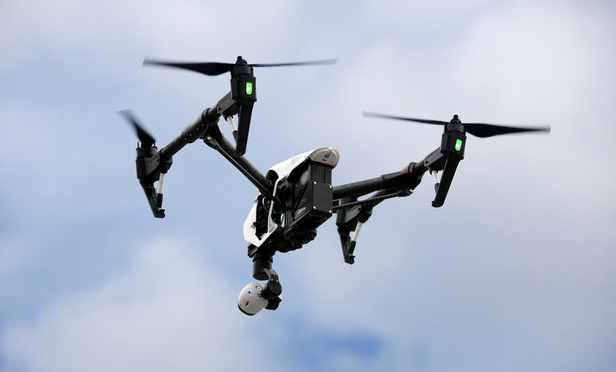Drone law practices may finally be taking off.
After an initial flurry of activity that saw the proliferation of drone law practice groups several years ago, the anticipated steep trajectory of drone-related legal work failed to come to pass as regulations on the commercial use of the unmanned aerial vehicles restricted industry growth. But with the unmanned aerial vehicle industry continuing to evolve, law firms with drone practices are finally getting off the ground.
“There’s far more work now than there was three years ago,” said Michael Drobac, a senior policy adviser at Akin Gump’s emerging technologies group and director of the Small UAV Coalition—an organization whose members include Amazon.com Inc., Alphabet Inc.’s Google, Intel Corp., Verizon Communications Inc. and other manufacturers and operators of unmanned aerial vehicles. “This industry is far more complex that most people originally thought.”
Lawyers are being called upon to help clients navigate federal, state and even international regulations set by such civil bodies as the European Aviation Safety Agency and the United Nations. They are obtaining needed exemptions, licenses and airspace waivers from the Federal Aviation Administration for clients. Some are working to influence policy. Others are contending with state and local privacy and liability issues. And some are bringing in expertise from other disciplines, such as tax law and intellectual property.
“There are so many different areas of law that this technology touches now that you really need a cross disciplinary team to provide clients with the full gamut of services at this point,” said Matthew Grosack, a litigator at DLA Piper who says that over the course of the last two years has seen cases related to drones become half his Miami legal practice, including product liability. (see Grosack discuss how new technologies are presenting opportunities for lawyers.)
Hogan Lovells partner Lisa Ellman, who co-chairs the firm’s unmanned aircraft system’s practice, said drone law is still a growing practice area and there is plenty of legal work to go around. A former White House and Department of Justice emerging technology policymaker, Ellman said most, if not all, of her practice relates to drone law.
Ellman assisted CNN last year in its receipt of a first-of-its-kind waiver from the FAA to legally fly unmanned aircraft systems over people for news gathering and reporting purposes. The waiver was considered a big step forward for the industry because some of the most promising applications of commercial drones—disaster response, news gathering and aerial photography—require the ability to fly over people.
Regulatory advice, waivers to flight rules, export control, privacy, corporate law and product liability are all relevant to her drone law practice. The firm even hired a business and market strategist with over a decade of experience in the drone industry to consult with clients and give them ideas about how they can incorporate drones into their companies to make work safer or more efficient.
Morrison Foerster’s drone law practice, which started three years ago, serves a wide range of clients. One uses drones to inspect solar installations and windmill blades. Another uses infrared-equipped drones to conduct Sandhill Crane counts at night while the normally skittish birds sleep. Sometimes a developer wants to license technology to a drone manufacturer, or the other way around, said MoFo attorney Joanna Simon.
Still, many lawyers doing drone work focus on shaping public policy.
“Most of the people operating in this space have a stake in how the regulations are going to be written,” Simon said. “We’re doing the same type of work for clients in different countries too, across the globe—reviewing regulatory proposals, commenting on them, trying to help governments develop a regulatory framework that makes sense for the burgeoning industry.”
Big Law attracts clients in what many see as a nascent industry filled with potential because they can provide advice on intellectual property, venture funding, aviation regulation and product liability, Simon said. But small firms with drone specialties also are finding they can play a big role, marketing their services to those needing operational licenses and applying for airspace waivers—all for a lower price than Big Law, said Drobac.
Indeed, six of the top 10 firms with the most clients seeking FAA permission to fly a drone commercially between September 2014 and December 2015 were small or solo firms, according to data compiled from FAA records by Jonathan Rupprecht, a solo-practitioner based in South Florida whose practice focuses on drone law.
But small firms, too, have noticed a shift in client demands for a broader array of services. Rupprecht said clients initially wanted regulatory advice or exemptions to drone operating rules—work that involved mostly federal regulatory legal expertise. Now, however, the work requires knowledge of state law, as states and even municipalities have moved to regulate drones on matters ranging from liability to privacy. His drone law website and blog now get questions about business structuring, tax, contracts, leasing, trademark, patents and even employment law issues, which he refers to other lawyers.
Contact Monika Gonzalez Mesa at [email protected]. On Twitter: @MonikaMesa1





